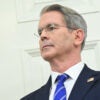With a score of 78.3 in the 2012 Index of Economic Freedom published by The Heritage Foundation and The Wall Street Journal, Chile is now the seventh economically freest nation in the world (out of 179 countries ranked) and is number one in all of Latin America.
Its overall score improvement—nearly one point—reflects better protection of property rights, more vigilance against government corruption, and greater monetary freedom—although there is room for additional improvement in business and labor freedom.
The Daily Signal depends on the support of readers like you. Donate now
Led since 2010 by President Sebastian Piñera’s center-right Alianza coalition (one of only two elected center-right governments currently in office in South America), Chile’s global leadership in economic freedom has been built over many decades on the solid foundations of rule of law, limited government, regulatory efficiency, and open markets. In particular, the Piñera government has adhered to prudent public finance management practices that have kept public debt, inflation, and budget deficits under control.
With a transparent and stable business climate, Chile maintains a dynamic environment for entrepreneurs. Barriers to free trade are quite low, and commercial operations are aided by efficient regulations that support open-market policies. Foreign investment is welcome. Despite some stresses in the financial system, Chile’s modern and diversified economy has survived global economic turmoil relatively unscathed. Its exports of minerals, wood, fruit, seafood, and wine drive GDP growth. Other Andean countries have followed Chile’s lead, notably Peru (# 42), Colombia (# 45), and Panama (# 55).
From 1990 to 2009, Chile’s left-of-center governments largely maintained the market-based institutions and sound economic policies established by University of Chicago–trained economists during the 17-year rule of General Augusto Pinochet. Chile is the world’s leading producer of copper and has rebounded from the effects of a major earthquake in early 2010—which is itself a strong indicator of the resilience of the Chilean economy. An innovative, countercyclical fiscal policy accumulates surpluses when copper prices are high and operates in deficit only when prices and economic activity are low. This has helped maintain fiscal balance.
Chile has pursued free trade agreements with countries around the world. The financial system remains stable, and prudent regulations allowed banks to withstand the global financial turmoil with little disruption. In 2010, Chile became the first country in South America invited to become a member of the Organization for Economic Co-operation and Development (OECD)—a strong signal of its status as a truly first-world, developed country. All OECD member countries rank in the top one-third of the Index of Economic Freedom.
On the most recent Forbes “Best Countries for Business” list, Chile ranked #6 for market performance, #7 for trade freedom (the country currently has 57 regional or bilateral trade agreements) and #1 in personal freedom.






























